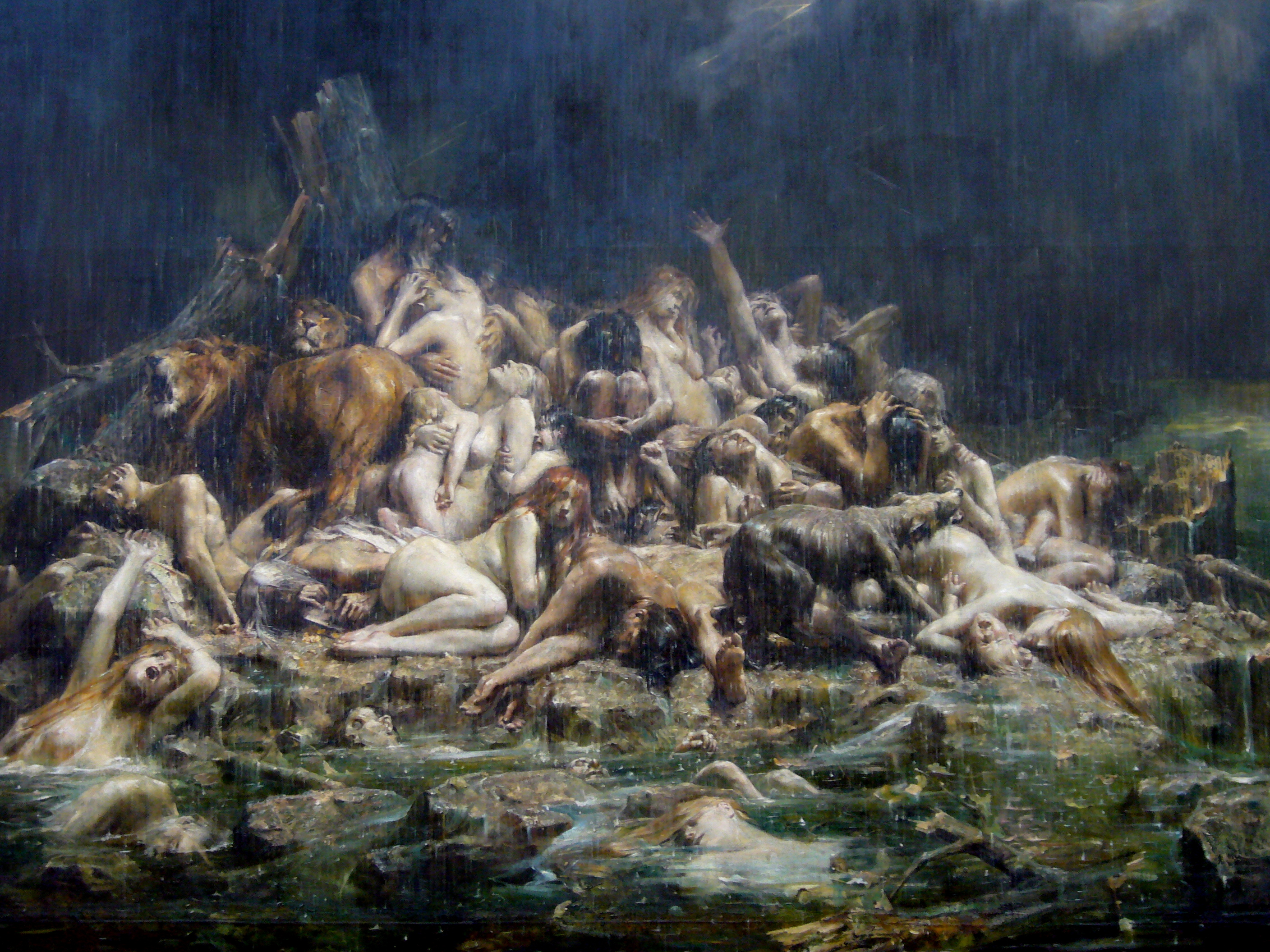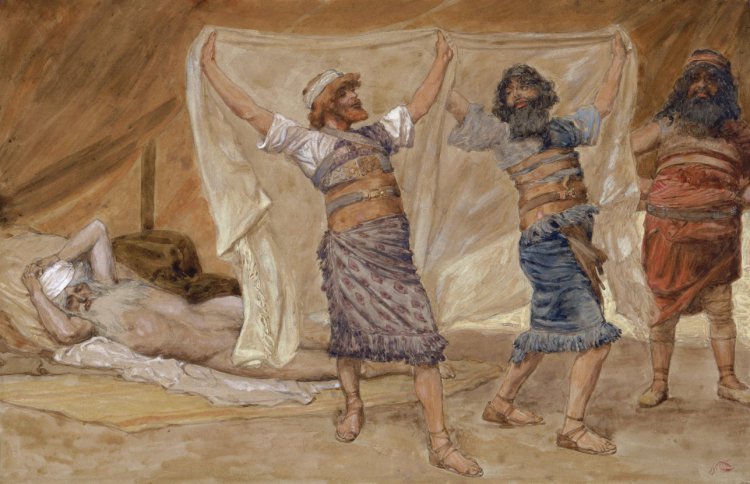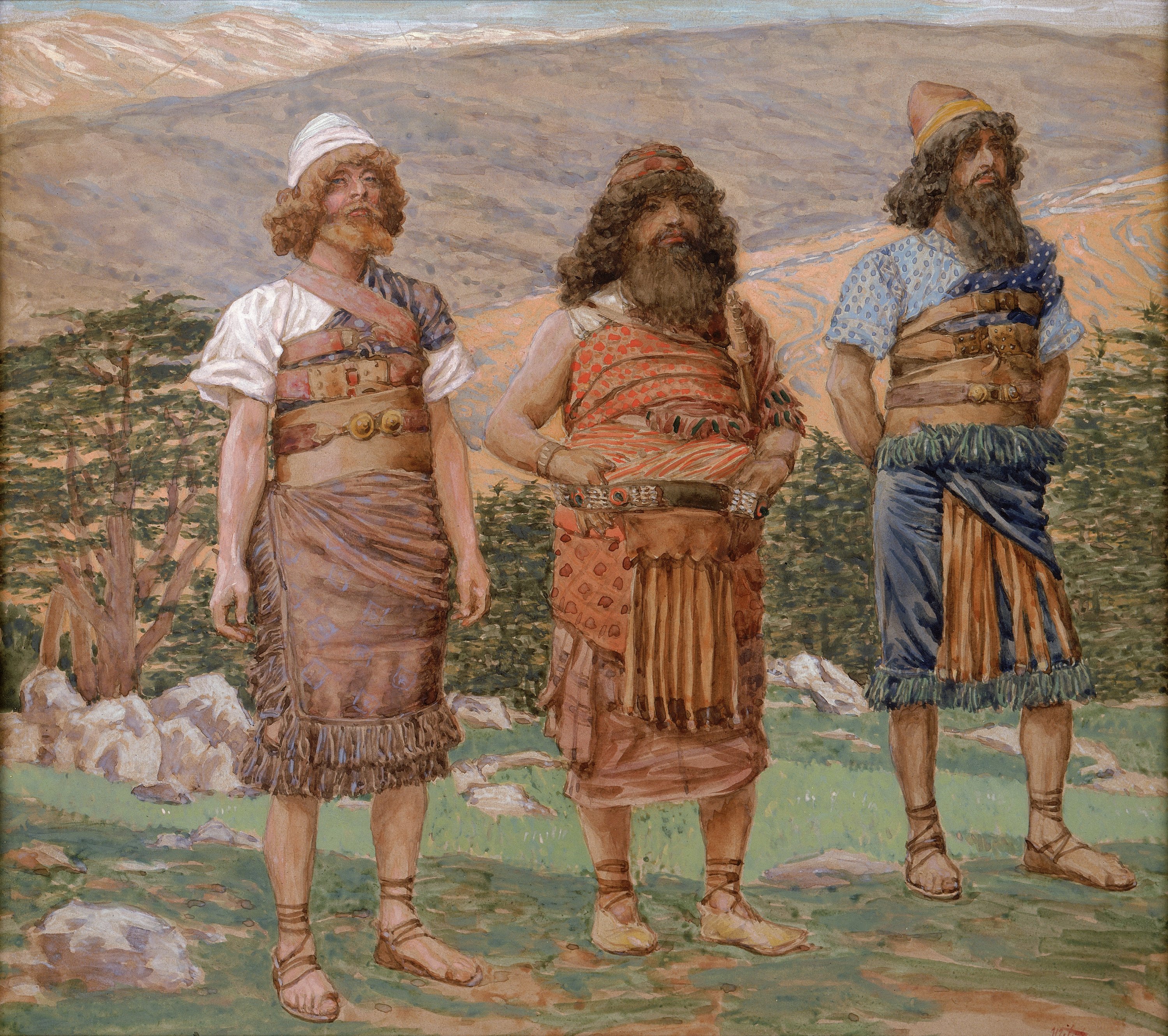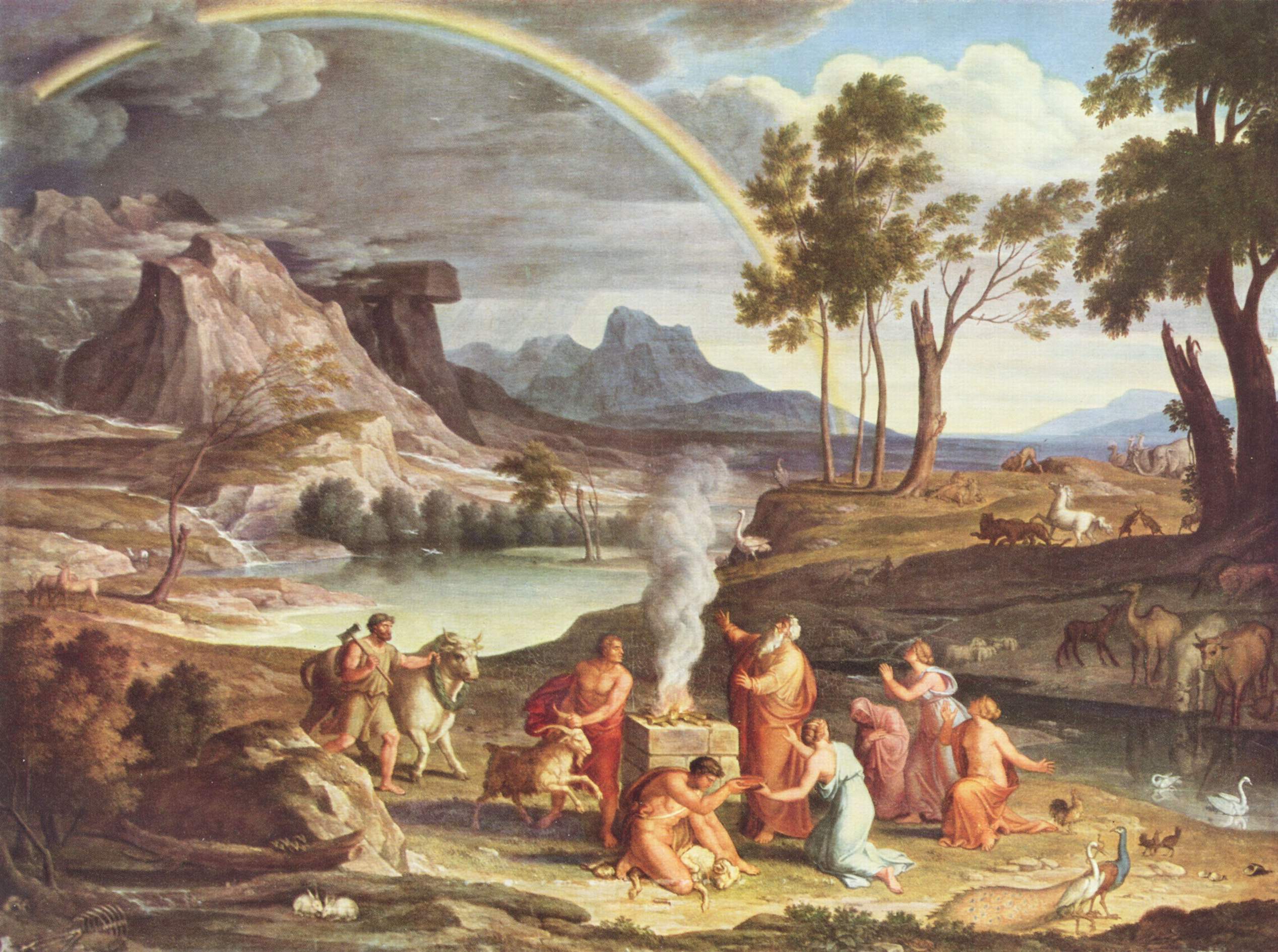|
Noah
Noah ''Nukh''; am, ኖህ, ''Noḥ''; ar, نُوح '; grc, Νῶε ''Nôe'' () is the tenth and last of the pre-Flood patriarchs in the traditions of Abrahamic religions. His story appears in the Hebrew Bible (Book of Genesis, chapters 5–9), the Quran and Baha'i writings. Noah is referenced in various other books of the Bible, including the New Testament, and in associated deuterocanonical books. The Genesis flood narrative is among the best-known stories of the Bible. In this account, Noah labored faithfully to build the Ark at God's command, ultimately saving not only his own family, but mankind itself and all land animals, from extinction during the Flood. Afterwards, God made a covenant with Noah and promised never again to destroy all the Earth's creatures with a flood. Noah is also portrayed as a "tiller of the soil" and as a drinker of wine. Biblical narrative Tenth and final of the pre-Flood (antediluvian) Patriarchs, son to Lamech and an unnamed mother ... [...More Info...] [...Related Items...] OR: [Wikipedia] [Google] [Baidu] |
Noah's Ark
Noah's Ark ( he, תיבת נח; Biblical Hebrew: ''Tevat Noaḥ'')The word "ark" in modern English comes from Old English ''aerca'', meaning a chest or box. (See Cresswell 2010, p.22) The Hebrew word for the vessel, ''teva'', occurs twice in the Torah, in the flood narrative (Book of Genesis 6-9) and in the Book of Exodus, where it refers to the basket in which Jochebed places the infant Moses. (The word for the Ark of the Covenant is quite different.) The Ark is built to save Noah, his family, and representatives of all animals from a divinely-sent flood intended to wipe out all life, and in both cases, the ''teva'' has a connection with salvation from waters. (See Levenson 2014, p.21) is the vessel in the Genesis flood narrative through which God spares Noah, his family, and examples of all the world's animals from a global deluge. The story in Genesis is repeated, with variations, in the Quran, where the Ark appears as ''Safinat Nūḥ'' ( ar, سَفِينَةُ نُو ... [...More Info...] [...Related Items...] OR: [Wikipedia] [Google] [Baidu] |
Genesis Flood Narrative
The Genesis flood narrative (chapters 6–9 of the Book of Genesis) is the Hebrew version of the universal flood myth. It tells of God's decision to return the universe to its pre- creation state of watery chaos and remake it through the microcosm of Noah's ark. The Book of Genesis was probably composed around the 5th century BCE, although some scholars believe that Primeval history (chapters 1–11), including the flood narrative, may have been composed and added as late as the 3rd century BCE. It draws on two sources, called the Priestly source and the non-Priestly or Yahwist, and although many of its details are contradictory, the story forms a unified whole. A global flood as described in this myth is inconsistent with the physical findings of geology, paleontology, and the global distribution of species. A branch of creationism known as flood geology is a pseudoscientific attempt to argue that such a global flood actually occurred. Some Christians have preferred t ... [...More Info...] [...Related Items...] OR: [Wikipedia] [Google] [Baidu] |
Japheth
Japheth ( he, יֶפֶת ''Yép̄eṯ'', in pausa ''Yā́p̄eṯ''; el, Ἰάφεθ '; la, Iafeth, Iapheth, Iaphethus, Iapetus) is one of the three sons of Noah in the Book of Genesis, in which he plays a role in the story of Noah's drunkenness and the curse of Ham, and subsequently in the Table of Nations as the ancestor of the peoples of the Aegean Sea, Anatolia, and elsewhere. In medieval and Early modern Europe, early modern European tradition he was considered to be the progenitor of the European peoples,Ivane Javakhishvili, Javakhishvili, Ivane (1950), ''Historical-Ethnological problems of Georgia, the Caucasus and the Near East''. Tbilisi, pp. 130–135 (in Georgian language, Georgian). while Islamic traditions also include the Chinese people among his descendants. Etymology The meaning of the name ''Japheth'' is disputable. There are two possible sources to the meaning of the name: * From Aramaic root , meaning ''to extend''. In this case, the name would mean ''m ... [...More Info...] [...Related Items...] OR: [Wikipedia] [Google] [Baidu] |
Ham, Son Of Noah
Ham (in ), according to the Table of Nations in the Book of Genesis, was the second son of Noah and the father of Cush, Mizraim, Phut and Canaan. Ham's descendants are interpreted by Flavius Josephus and others as having populated Africa and adjoining parts of Asia. The Bible refers to Egypt as "the land of Ham" in Psalm 78:51; 105:23, 27; 106:22; 1 Chronicles 4:40. Etymology Since the 17th century, a number of suggestions have been made that relate the name ''Ham'' to a Hebrew word for "burnt", "black" or "hot", to the Egyptian word '' ḥm'' for "servant" or the word '' ḥm'' for "majesty" or the Egyptian word '' kmt'' for "Egypt". A 2004 review of David Goldenberg's ''The Curse of Ham: Race and Slavery in Early Judaism, Christianity and Islam'' (2003) states that Goldenberg "argues persuasively that the biblical name Ham bears no relationship at all to the notion of blackness and as of now is of unknown etymology." In the Bible indicates that Noah became the father ... [...More Info...] [...Related Items...] OR: [Wikipedia] [Google] [Baidu] |
Shem
Shem (; he, שֵׁם ''Šēm''; ar, سَام, Sām) ''Sḗm''; Ge'ez: ሴም, ''Sēm'' was one of the sons of Noah in the book of Genesis and in the book of Chronicles, and the Quran. The children of Shem were Elam, Ashur, Arphaxad, Lud and Aram, in addition to unnamed daughters. Abraham, the patriarch of Jews, Christians, and Muslims, was one of the descendants of Arphaxad. Islamic literature describes Shem as one of the believing sons of Noah. Some sources even identify Shem as a prophet in his own right and that he was the next prophet after his father. Shem is mentioned several times in Genesis 5-11 as well as 1 Chronicles 1:4. In the Bible Genesis 10 Genesis 10:21 refers to relative ages of Shem and his brother Japheth, but with sufficient ambiguity to have yielded different English translations. The verse is translated in the King James Version as: "Unto Shem also, the father of all the children of Eber, the brother of Japheth the elder, even to him ... [...More Info...] [...Related Items...] OR: [Wikipedia] [Google] [Baidu] |
Book Of Genesis
The Book of Genesis (from Greek ; Hebrew: בְּרֵאשִׁית ''Bəreʾšīt'', "In hebeginning") is the first book of the Hebrew Bible and the Christian Old Testament. Its Hebrew name is the same as its first word, ( "In the beginning"). Genesis is an account of the creation of the world, the early history of humanity, and of Israel's ancestors and the origins of the Jewish people. Tradition credits Moses as the author of Genesis, as well as the books of Exodus, Leviticus, Numbers and most of Deuteronomy; however, modern scholars, especially from the 19th century onward, place the books' authorship in the 6th and 5th centuries BC, hundreds of years after Moses is supposed to have lived.Davies (1998), p. 37 Based on scientific interpretation of archaeological, genetic, and linguistic evidence, most scholars consider Genesis to be primarily mythological rather than historical. It is divisible into two parts, the primeval history (chapters 1–11) and the ancestra ... [...More Info...] [...Related Items...] OR: [Wikipedia] [Google] [Baidu] |
Judaism
Judaism ( he, ''Yahăḏūṯ'') is an Abrahamic, monotheistic, and ethnic religion comprising the collective religious, cultural, and legal tradition and civilization of the Jewish people. It has its roots as an organized religion in the Middle East during the Bronze Age. Modern Judaism evolved from Yahwism, the religion of ancient Israel and Judah, by the late 6th century BCE, and is thus considered to be one of the oldest monotheistic religions. Judaism is considered by religious Jews to be the expression of the covenant that God established with the Israelites, their ancestors. It encompasses a wide body of texts, practices, theological positions, and forms of organization. The Torah, as it is commonly understood by Jews, is part of the larger text known as the ''Tanakh''. The ''Tanakh'' is also known to secular scholars of religion as the Hebrew Bible, and to Christians as the "Old Testament". The Torah's supplemental oral tradition is represented by later tex ... [...More Info...] [...Related Items...] OR: [Wikipedia] [Google] [Baidu] |
Lamech (father Of Noah)
Lamech (; he, ''Lemeḵ'', in pausa ''Lāmeḵ''; gr, Λάμεχ ''Lámekh'') was a patriarch in the genealogies of Adam in the Book of Genesis. He is part of the genealogy of Jesus in Luke 3:36. Lamech (Arabic: ''Lamik'') is also mentioned in Islam in the various collections of tales of the prophets who preceded Muhammad, which mentions him in an identical manner. Bible narrative Biblical genealogy Lamech is the eighth-generation descendant of Adam (), the son of Methuselah, and the father of Noah (), in the genealogy of Seth in Genesis 5. In Genesis 5:12-25, Lamech was a son of Methuselah, who was a grandson of Jared, who was a grandson of Kenan descended from Adam. Genesis 5:28–31 records that Lamech was 182 (according to the Masoretic Text; 188 according to the Septuagint) years old at the birth of Noah and lived for another 595 years, attaining an age at death of 777 years, five years before the Flood A flood is an overflow of water ( or rarely ... [...More Info...] [...Related Items...] OR: [Wikipedia] [Google] [Baidu] |
Covenant (biblical)
The Hebrew Bible makes reference to a number of covenants ( he, בְּרִיתוֹת) with God ( YHWH). These include the Noahic Covenant (in Genesis), which is between God and all living creatures, as well as a number of more specific covenants with Abraham, the whole Israelite people, the Israelite priesthood, and the Davidic lineage of kings. In form and terminology, these covenants echo the kinds of treaty agreements in the surrounding ancient world. The Book of Jeremiah, verses says that Yahweh will establish a new covenant with the house of Israel and the house of Judah. Most Christians believe this New Covenant is the "replacement" or "final fulfilment" of the Old Covenant described in the Old Testament and as applying to the People of God, while some believe both covenants are still applicable in a dual covenant theology. Ancient Near Eastern treaties The Hebrew term בְּרִית ''bĕriyth'' for "covenant" is from a root with the sense of "cutting", beca ... [...More Info...] [...Related Items...] OR: [Wikipedia] [Google] [Baidu] |
Great Flood
A flood myth or a deluge myth is a myth in which a great flood, usually sent by a deity or deities, destroys civilization, often in an act of divine retribution. Parallels are often drawn between the flood waters of these myths and the primaeval waters which appear in certain creation myths, as the flood waters are described as a measure for the cleansing of humanity, in preparation for rebirth. Most flood myths also contain a culture hero, who "represents the human craving for life". The flood-myth motif occurs in many cultures, including the Mesopotamian flood stories, Native American in North America, the Genesis flood narrative, '' manvantara-sandhya'' in Hinduism, and Deucalion and Pyrrha in Greek mythology. Mythologies One example of a flood myth is the ''Epic of Gilgamesh''. Many scholars believe that this account was copied from the Akkadian '' Atra-Hasis'', which dates to the 18th century BCE. In the Gilgamesh flood myth, the highest god, Enlil, decides t ... [...More Info...] [...Related Items...] OR: [Wikipedia] [Google] [Baidu] |
Abrahamic Religions
The Abrahamic religions are a group of religion Religion is usually defined as a social- cultural system of designated behaviors and practices, morals, beliefs, worldviews, texts, sanctified places, prophecies, ethics, or organizations, that generally relates humanity to supernatural ...s centered around worship of the God in Abrahamic religions, God of Abraham. Abraham, a Hebrews , Hebrew patriarch, is extensively mentioned throughout Abrahamic religious scriptures such as the Bible and the Quran. Jewish tradition claims that the Twelve Tribes of Israel are descended from Abraham through his son Isaac and grandson Jacob, whose sons formed the nation of the Israelites in Canaan (or the Land of Israel); Islamic tradition claims that twelve Arab tribes known as the Ishmaelites are descended from Abraham through his son Ishmael in the Arabian Peninsula. In its early stages, Origins of Judaism , Israelite religion was derived from the Canaanite religion, Canaanite rel ... [...More Info...] [...Related Items...] OR: [Wikipedia] [Google] [Baidu] |









